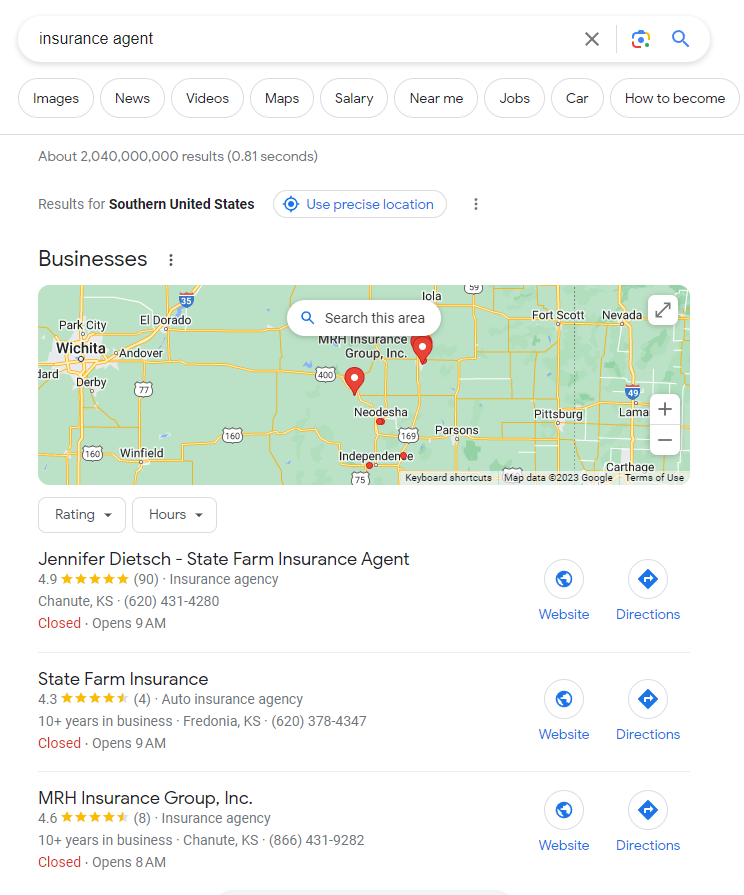The Ultimate Guide to SEO for Insurance Agents
Having a strong online presence is crucial for businesses of all industries, including insurance agencies. This is where search engine optimization (SEO) comes into play.
SEO is a powerful tactic for insurance marketing that involves optimizing your website and online content to rank higher in search engine results pages (SERPs) for relevant keywords and phrases.
Doing so can attract more organic traffic to your website, generate more leads, and ultimately increase your revenue.

In this guide, we’ll explore the different aspects of SEO and provide you with actionable tips and techniques to improve your online visibility and reach your target audience.
So, whether you’re a seasoned insurance agent or just starting in the industry, read on to learn why SEO is essential for your business.
Shortcuts:
- What is SEO for Insurance Agents?
- Conducting Keyword Research
- On-Page SEO for Insurance Agents
- Local SEO for Insurance Agents
- Technical SEO for Insurance Agents
- Measuring and Analyzing SEO Performance
- Frequently Asked Questions
What is SEO for Insurance Agents?
SEO is the process of optimizing online content and website structure to rank higher in search engine results pages (SERPs) for relevant keywords and phrases. This involves a variety of techniques, including keyword research, on-page optimization, off-page optimization, local SEO, and technical SEO.
SEO is essential for you as an insurance agent because it helps you attract more organic traffic to your website, generate more leads and increase your revenue.
By ranking higher in SERPs for relevant keywords, you can increase your online visibility and reach your target audience more effectively.
Additionally, SEO allows you to establish yourself as a trusted authority in their industry, which can help attract and retain more clients over time.
SEO can increase website traffic and lead generation, give better online visibility, enhance your brand recognition and lead to a higher return on investment (ROI) compared to traditional marketing methods.
In short, knowing SEO is a great skill that can help you in selling insurance more efficiently by helping you establish trust and generate more leads.
Conducting Keyword Research
Keyword research is a critical aspect of SEO for insurance agents because it helps you identify the most relevant and high-traffic keywords and phrases to target in your online content.
By choosing the right keywords, you can improve your website’s search engine rankings and attract more organic traffic to the site.
The process of conducting keyword research typically involves several steps.
First, you will need to brainstorm a list of potential keywords and phrases that are relevant to your business and industry.
You can do this by putting yourself in your target audience’s shoes and thinking about the words and phrases they might use when searching for insurance-related information online.
Once you have a list of potential keywords, you can use keyword research tools, such as Google Keyword Planner or Ahrefs, to evaluate their potential traffic and competition levels.
These SEO tools provide valuable insights into how often a keyword is searched for, how difficult it is to rank for, and what other related keywords are worth targeting.
Keep this in mind when choosing the correct keywords:
It’s important to choose keywords that have a reasonable search volume and level of competition. If a keyword is too competitive, it may be challenging to rank for, while a keyword with low search volume may not generate enough traffic to make it worth targeting.
You should also consider targeting long-tail keywords, which are longer and more specific phrases that are easier to rank for and tend to attract more qualified traffic.
On-Page SEO for Insurance Agents
On-page SEO refers to the practice of optimizing individual web pages to rank higher in search engine results pages (SERPs) and generate more organic traffic.
It involves a variety of techniques, including optimizing content, HTML source code, and website structure.
It is also essential for insurance agents because it helps improve the relevancy and quality of website content, making it more likely to rank higher in search engine results pages.
Here’s a checklist that can help you optimize your website for on-page SEO:
- Conduct keyword research to identify relevant and high-traffic keywords to target in your content.
- Optimize your website’s meta tags, including title tags and meta descriptions, to include target keywords and entice users to click through to your website.
- Create high-quality, informative, and engaging content that targets your chosen keywords and provides value to your target audience.
- Use header tags (H1, H2, H3, etc.) to structure your content and make it easier for search engines to understand its hierarchy.
- Incorporate internal links to other relevant pages on your website to improve navigation and help search engines understand the relationship between your pages.
- Optimize images with descriptive file names and alt text that includes target keywords.
- Ensure that your website is mobile-friendly and loads quickly to provide a positive user experience.
- Use structured data markup to provide additional context and information to search engines about your website and its content.
To sum up, you should focus on including target keywords in strategic locations throughout your content, including:
- The title tag and meta description
- The first paragraph of the content
- The URL
- Header tags (H1, H2, H3)
- Alt text for images
- Throughout the body of the content, while maintaining a natural and engaging tone.
Local SEO for Insurance Agents
Local SEO for Insurance Agents refers to the process of optimizing a website to rank higher in local SERPs for geographically related search queries.
As a local business, an insurance agent needs to ensure that the website appears in relevant local search results when potential customers search for insurance-related queries.
If you master local SEO, you are more likely to get a mention above search results when someone near you searches for “insurance agent”. If you feed the search engines with the right data, prospects will get your contact info straight from the search results.

Best practices when optimizing your page for Local SEO:
- Claim and optimize your Google My Business listing, including your business name, address, phone number, and hours of operation.
- Ensure that your website’s NAP (Name, Address, Phone number) information is consistent across all online directories and platforms.
- Use location-based keywords in your website’s meta tags, content, and URLs.
- Build high-quality backlinks from other reputable local websites and directories.
- Use schema markup to provide additional information to search engines about your business, such as your address, phone number, and hours of operation.
- Encourage customer reviews and respond to them promptly to establish trust and credibility with potential customers.
Technical SEO for Insurance Agents
Technical SEO refers to the process of optimizing a website’s technical infrastructure to improve its search engine visibility and performance. It involves optimizing the website’s backend to ensure that search engines can crawl, index, and understand its content.
Poor technical SEO can result in slow loading times, broken links, and other technical issues that can negatively impact the user experience and search engine rankings.
Checklist for technical SEO:
- Ensure that your website is mobile-friendly and has a responsive design.
- Improve website speed by optimizing images, reducing server response time, and leveraging caching and compression.
- Use HTTPS to ensure that your website is secure and boost user trust and search engine rankings.
- Ensure that your website’s robots.txt file is correctly configured to allow search engine bots to crawl your site.
- Fix broken links and ensure that all internal and external links are working correctly.
- Use structured data markup to provide additional context and information about your website’s content to search engines.
- Create a sitemap and submit it to search engines to ensure that all pages are crawled and indexed correctly.
- Ensure that the website’s code is clean, streamlined, and optimized for search engines.
Measuring and Analyzing SEO Performance
Measuring and analyzing SEO performance is crucial for insurance agents to determine their SEO strategy’s effectiveness and identify improvement areas. It helps agents understand which tactics are working, and which are not - and make data-driven decisions to optimize their SEO strategy for better results.
How to track and analyze SEO performance:
- Set specific goals and KPIs (Key Performance Indicators) to measure the success of your SEO strategy.
- Analyze traffic. Use web analytics tools like Google Analytics or Adobe Analytics to track website traffic, user behavior, and conversions. By analyzing website traffic you can understand the volume of traffic your website receives and identify trends, such as traffic sources, user behavior, and bounce rates.
- Keyword rankings: Tracking keyword rankings allows agents to see how well their website is ranking for targeted keywords and identify areas for improvement.
- Backlink analysis: Analyzing backlink profiles helps agents understand the quality and relevance of their website’s backlinks and identify opportunities for link building.
- Social media metrics: Tracking social media metrics helps agents understand how social media is impacting their website’s traffic, engagement, and conversions.
Frequently Asked Questions
What is the best way to optimize images for SEO on my insurance agency website?
The best way to optimize images for SEO on your insurance agency website is to use descriptive file names and alt tags that include relevant keywords.
Additionally, compressing images to reduce their file size can improve website loading speed and user experience, which is a ranking factor for search engines.
What are the most important technical SEO factors to consider for insurance agent websites?
Some of the most important technical SEO factors to consider for insurance agent websites include site speed, mobile-friendliness, crawlability, and site structure.
Ensuring that your website loads quickly is mobile-responsive, can be easily crawled by search engines, and has a clear and organized structure can improve your search engine rankings and user experience.
How can I improve my insurance agency website’s page load speed?
Answer: You can improve your insurance agency website’s page load speed by compressing images and videos, minimizing HTTP requests, reducing server response time, enabling browser caching, and minimizing the use of external scripts and plugins.
Google’s PageSpeed Insights tool can provide recommendations specific to your website.
What is a sitemap and how does it impact SEO for my insurance agency website?
A sitemap is a file that lists all the pages on your website and their relationship to each other. Submitting a sitemap to search engines can help them crawl and index your website more efficiently, which can improve your search engine rankings.
What is structured data and how can it benefit my insurance agency website’s SEO?
Structured data is a type of code that provides search engines with additional context and information about your website’s content. Implementing structured data can help search engines better understand your website’s content and improve your search engine visibility through rich snippets, which can increase click-through rates and improve user experience.
In Conclusion
SEO is essential for agents who want to stay competitive in today’s digital landscape. By following the best practices and implementing the techniques outlined here, you can improve your website’s search engine rankings, drive more traffic to your website and increase your online visibility and credibility.
Growing organic traffic to your website will give you more organic, bottom-of-the-funnel leads which can in the end spare your from buying insurance leads.
Our final recommendation is for you to continually monitor and optimize your SEO strategy to ensure that you remain relevant and competitive.
